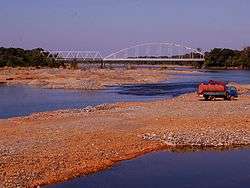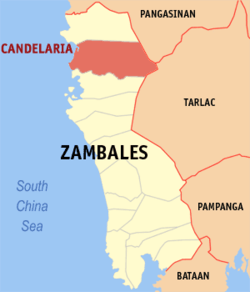Candelaria, Zambales
Candelaria, officially the Municipality of Candelaria, is a 3rd class municipality in the province of Zambales, Philippines. According to the 2015 census, it has a population of 27,174 people.[3]
Candelaria | |
|---|---|
| Municipality of Candelaria | |
 | |
 Seal | |
 Map of Zambales with Candelaria highlighted | |
OpenStreetMap 
| |
.svg.png) Candelaria Location within the Philippines | |
| Coordinates: 15°38′N 119°56′E | |
| Country | |
| Region | Central Luzon (Region III) |
| Province | Zambales |
| District | 2nd district |
| Founded | 1870 |
| Barangays | 16 (see Barangays) |
| Government | |
| • Type | Sangguniang Bayan |
| • Mayor | Napoleon E. Edquid |
| • Vice Mayor | Byron Jones E. Edquilang |
| • Congressman | Cheryl D. Montalla |
| • Electorate | 17,878 voters (2019) |
| Area | |
| • Total | 333.59 km2 (128.80 sq mi) |
| Population (2015 census)[3] | |
| • Total | 27,174 |
| • Density | 81/km2 (210/sq mi) |
| • Households | 6,034 |
| Economy | |
| • Income class | 3rd municipal income class |
| • Poverty incidence | 20.54% (2015)[4] |
| • Revenue (₱) | 111,355,191.48 (2016) |
| Time zone | UTC+8 (PST) |
| ZIP code | 2212 |
| PSGC | |
| IDD : area code | +63 (0)47 |
| Climate type | tropical monsoon climate |
| Native languages | Sambal Ilocano Tagalog |
| Website | candelariazambales |
History
During the pre-Spanish era, the area of Candelaria was unsettled forest. The Spanish East Indies government made it a sitio of Masinloc, one of the oldest towns of Zambales. Sambal settlers from other parts of Masinloc, who found Candelaria an ideal location to live, played an important role in creating Candelaria as a separate town in 1870.
The name of the town could have come from the name of the wife of the first Alcalde Mayor, who named the town after her as a birthday gift. Candelaria is also the Spanish word for Candlemas, and that the Virgin of Candelaria is a Marian title popular in the Hispanic world.
Geography
Candelaria is 42 kilometres (26 mi) from the capital town of Iba. It is nestled at the foot of the Zambales Mountains in the east and lies along coastline of the South China Sea in the west, with a total land area of 33,359 hectares (82,430 acres), making it the third-largest town in terms of land area in Zambales. [2] This municipality is known for Uacon Lake, the cleanest lake in Central Luzon, and for its numerous beach resorts.
Barangays
Candelaria is politically subdivided into 16 barangays. [2]
- Babancal
- Binabalian
- Catol
- Dampay
- Lauis
- Libertador
- Malabon (San Roque)
- Malimanga
- Pamibian
- Panayonan
- Pinagrealan
- Poblacion
- Sinabacan
- Taposo
- Uacon
- Yamot
Climate
| Climate data for Candelaria, Zambales | |||||||||||||
|---|---|---|---|---|---|---|---|---|---|---|---|---|---|
| Month | Jan | Feb | Mar | Apr | May | Jun | Jul | Aug | Sep | Oct | Nov | Dec | Year |
| Average high °C (°F) | 30 (86) |
32 (90) |
33 (91) |
34 (93) |
32 (90) |
31 (88) |
30 (86) |
29 (84) |
29 (84) |
30 (86) |
31 (88) |
30 (86) |
31 (88) |
| Average low °C (°F) | 19 (66) |
20 (68) |
21 (70) |
23 (73) |
25 (77) |
25 (77) |
24 (75) |
24 (75) |
24 (75) |
23 (73) |
22 (72) |
20 (68) |
23 (72) |
| Average precipitation mm (inches) | 9 (0.4) |
10 (0.4) |
16 (0.6) |
27 (1.1) |
137 (5.4) |
183 (7.2) |
215 (8.5) |
219 (8.6) |
190 (7.5) |
124 (4.9) |
45 (1.8) |
18 (0.7) |
1,193 (47.1) |
| Average rainy days | 4.6 | 4.4 | 6.9 | 10.3 | 21.8 | 25.4 | 27.2 | 26.4 | 25.2 | 19.7 | 13.8 | 7.0 | 192.7 |
| Source: Meteoblue (Use with caution: this is modeled/calculated data, not measured locally.) [5] | |||||||||||||
Demographics
|
| |||||||||||||||||||||||||||||||||||||||||||||
| Source: Philippine Statistics Authority[3][6][7][8] | ||||||||||||||||||||||||||||||||||||||||||||||
In the 2015 census, the population of Candelaria, Zambales, was 27,174 people,[3] with a density of 81 inhabitants per square kilometre or 210 inhabitants per square mile.
References
- "Municipality". Quezon City, Philippines: Department of the Interior and Local Government. Retrieved 31 May 2013.
- "Province: Zambales". PSGC Interactive. Quezon City, Philippines: Philippine Statistics Authority. Retrieved 12 November 2016.
- Census of Population (2015). "Region III (Central Luzon)". Total Population by Province, City, Municipality and Barangay. PSA. Retrieved 20 June 2016.
- "PSA releases the 2015 Municipal and City Level Poverty Estimates". Quezon City, Philippines. Retrieved 1 January 2020.
- "Candelaria: Average Temperatures and Rainfall". Meteoblue. Retrieved 26 April 2020.
- Census of Population and Housing (2010). "Region III (Central Luzon)". Total Population by Province, City, Municipality and Barangay. NSO. Retrieved 29 June 2016.
- Censuses of Population (1903–2007). "Region III (Central Luzon)". Table 1. Population Enumerated in Various Censuses by Province/Highly Urbanized City: 1903 to 2007. NSO.
- "Province of Zambales". Municipality Population Data. Local Water Utilities Administration Research Division. Retrieved 17 December 2016.
External links
| Wikimedia Commons has media related to Candelaria, Zambales. |